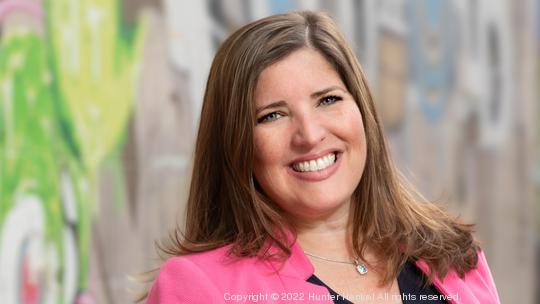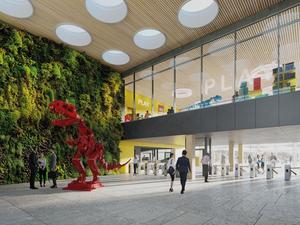
The Lego Group announced plans in June to construct a $1 billion advanced manufacturing plant in the Meadowville Technology Park in Chesterfield County. The project is expected to create 1,760 jobs. A groundbreaking is set to take later this year, and production is scheduled to begin in 2025.
Richmond Inno talked with Jennifer Wakefield, president and CEO of the Greater Richmond Partnership, about the central role her organization played in bringing the Denmark company to the region. She talked about the reasons why Lego selected Richmond and how the project might impact the overall tech and life sciences industry in the region.
What is the Greater Richmond Partnership? We are the lead economic development organization for the city of Richmond and the counties of Chesterfield, Henrico and Hanover. Essentially, what we do boils down to two words — recruit companies. We recruit companies that are not already located here that are within our targeted industry [which include advanced manufacturing, corporate services, finance and insurance, food and beverage, IT, life sciences and logistics and e-commerce]. Historically, about a third of these style of projects are advanced manufacturing, like the Lego project.
What role did the partnership play in attracting Lego? In economic development, if a company is looking at expanding or relocating a facility, about half the time they select a site selection consultant. The other half of the time they do it in-house. Lego had hired a site location consultant who reached out to me in late October of last year. We did not know who the company was because oftentimes in economic development we use code names for the projects. He told us that he had a large client that was looking for a specific size of acreage and that they wanted to do a solar farm with it. The greater Richmond market had been identified. We were short-listed at that point.
What factors do you believe were important in attracting Lego? The CEO of Lego Group [Niels Christiansen] said it was our location. We had a strategic location advantage. The Port of Virginia is nearby and right down the road. We have the Richmond Marine Terminal. We also have quick access to roads and rail, sea and air, so they are able to move product. We are in the middle of the U.S., equal distance from Miami to Maine. The other big factor was sustainability, and the effort and the strides that the commonwealth has made when it comes to sustainability. We knew with the sustainable aspect of the project they were going to want to partner with Dominion Energy and others to make sure that they could be as sustainable as possible. Finally, the diversity of our workforce. The values that Virginia has were important to Lego.
What role do you think the Lego project might have in attracting other industries, say a tech startup and life sciences company? We absolutely work hard to attract IT companies to this market as well as different types of technology. And not just data centers, which are a targeted focus for our market. And anytime a big company locates here, it attracts suppliers that the company will utilize. It also attracts workers who are going to want to work for that company. Lego is a global brand that everyone knows. Everyone has a very positive relationship with it. And we had so many people that have applied to work at Lego it almost crashed the website. That means we are drawing new talent to the market that might have otherwise not located to this area. Also, Lego has been interested in partnering with organizations that have a STEM perspective, because that is something that is very important to them.
What model do you use when looking to attract companies? You mean our secret sauce? (laughs)
Well, not the secrets but in general what do you do? It really depends on the type of industry that the company is in. It also depends on the type of company that they are as well, such as the size and where they are currently located. As well as who we are competing against. There are a lot of different factors. So, the business case for Lego may be wildly different than the business case for a Facebook data center or some other company that may want to locate here. We look at whether they have had a leadership change and if they have a presence in the Mid-Atlantic. We also look at the costs of their current location. We can look and see what the current costs are, like current leases say in the New York market, and see when a lease is coming up. We can then go through and run all of those numbers for our market and compare that to the market they are currently in or the other markets that we are competing against.
What are your overall thoughts on the tech and bio scene in Richmond? I think that it is emerging very quickly. There is a lot of interest in this market from the bio and life sciences sector as well as just technology overall. It’s established and yet at the same time it’s nascent. We have had Capital One who was been here a while, and people would look at it as a financial services company, but they consider themselves a tech company. They are our largest employer. So, there is a large industry here that has been called something other than a tech industry. But there are a huge number of engineers working at those firms. And the pandemic has caused a lot of those people to consider starting their own technology firms. I think there is a real opportunity there, and it is growing organically, which is what you want.
Do you think there is the necessary talent to support and foster a tech and life science sector in Richmond? I think there is, but Richmond has not been growing as fast as it should. Oftentimes when I compare us to other regions, Richmond has tended to outgrow the U.S. and Virginia but those are pretty low numbers. If you look at our peers like Raleigh-Charlotte or Nashville, we are not growing as fast as they are. I think a lot of that is because a lot of corporate executives don’t know a lot about the Richmond market when it comes to being a business location. And as such, talent doesn’t know about us as a business location.
How are you working to get the word out about innovation in Richmond? We have been working very closely with our partners in tourism at Richmond Regional Tourism and ChamberRVA to develop a campaign.
Is there anything going on in the Richmond tech and life sciences scene that you find interesting? If you look at the Alliance for Building Better Medicine that came out of VCU’s Medicines for All Institute, which is trying to change how medicines are made and bring product back to the U.S., it is important. That is looking to re-shore pharmaceuticals, and that will have a huge impact if they get a Build Back Better Act grant. They will know very, very soon. If so, that will change our market.

